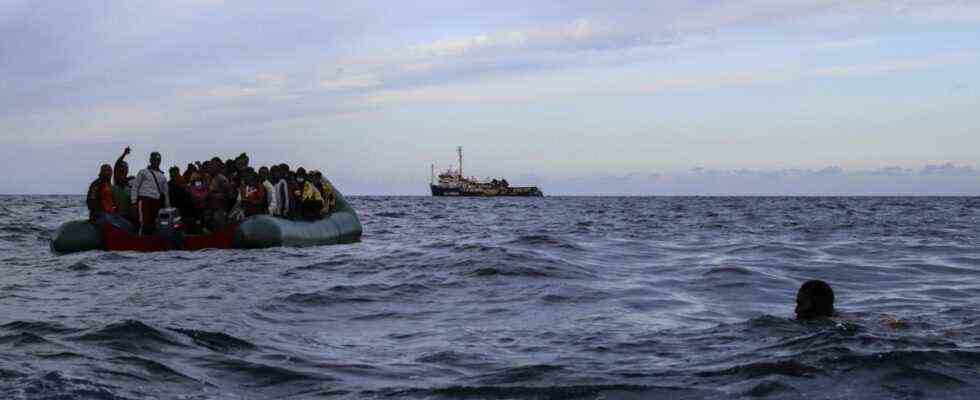With illegal immigration and rescuing migrants from distress at sea, judges and prosecutors in Agrigento must have become specialists over the years. After all, the jurisdiction of the court in the Sicilian provincial capital includes the island of Lampedusa, on which thousands of Mediterranean boat refugees arrive every year, and the port town of Porto Empedocle, in whose reception center many of those who land on Lampedusa are transferred.
Some of the Agrigento lawyers’ cases have made international headlines. When the then Italian Interior Minister Matteo Salvini prohibited rescued migrants from going ashore from overcrowded ships, prosecutors from there stepped in and made sure that the people disembarked. In addition, they initiated investigations against the Lega politician – for deprivation of liberty and abuse of office. The proceedings against the German Sea-Watch captain Carola Rackete were also discontinued in Agrigento. Now public prosecutors there have again applied for a case to be closed, and their reasoning could significantly improve the legal situation for private sea rescuers in the future.
In the case now it’s about the ship Mare Jonio the organization “Mediterranea Saving Humans” and events from May 2019. At that time, a dark green rubber dinghy was sinking, 40 nautical miles off North Africa’s coast, carrying 30 people, including two pregnant women and a two-year-old. the Mare Jonio took the migrants on board because of their mortal danger and landed with them on Lampedusa – although on instructions from Salvini’s Ministry of the Interior, the coast guard had forbidden and transmitted the transfer of the migrants to the Libyan coast guard.
Those responsible for the ship were accused of aiding and abetting illegal immigration. In addition, they are said to have violated Italian shipping law because their ship was not approved for the transport of people in emergency situations – it was confiscated after the action.
In Agrigento, however, the prosecutors found the team of the Mare Jonio was obliged to help the people in the leaky rubber boat. And they argued beyond the case, according to Italian media: The crime of aiding and abetting illegal immigration could only be committed by smugglers and those responsible for the transport of migrants – but not their rescuers, because “they act because they are forced to the need to save people “. Rescuing people at sea is above state rules and agreements to combat illegal immigration. And people in unsafe rubber dinghies on the sea must always be seen in danger.
Aiding and abetting illegal immigration is one of the accusations that have been repeatedly brought against members of rescue organizations, but captains of fishing boats who took in shipwrecked people have also landed in court with this charge in Italy, which is why the fundamental arguments from Agrigento are particularly exciting.
At the point that the Mare Jonio According to the reports, they wrote that at the time in question there was no Italian law that contained the obligation to certify a civilian ship for rescue operations. Other NGO ships have also been confiscated in recent years, such as that of the Sea-Watch organization, with the reasons that the ships were not approved as rescue ships. Incidentally, the category of private rescue ships does not exist in German shipping law either.
It was also right that the rescuers did not hand over the castaways to the Libyan coast guard, as Interior Minister Salvini had ordered, the prosecutors found in their application to discontinue the proceedings. Because rescued people have to be brought to a safe place, according to international agreements on the law of the sea and refugees. Libya, where war-like fighting took place in 2019, was by no means safe, so the decision not to call at Libya was “absolutely legitimate and not open to attack”.
According to the UN and other organizations, Libya is still not considered a safe place for refugees, even if there is currently no fighting there. The public prosecutors in Agrigento had attached a document from the UN refugee commissioner to their justification, reported La Repubblica, which states that ship captains should neither be instructed to bring rescued persons to Libya, nor feel compelled to do so for fear of punishment or because the allocation of safe havens is dragging on.
“The behavior of those under investigation does not turn out to be illegal,” as it was formulated in Agrigento, because it was within the framework of international and supranational obligations to save human lives at sea. All of this can also be interpreted as a late slap in the face for Salvini’s “policy of closed ports”, and it could initially be a blueprint for those lawyers in Ragusa, two hours’ drive from Agrigento, who are involved in a further investigation against the people of the Mare Jonio have to decide. But it could be important for all NGOs that are rescuing migrants in the Mediterranean – if the proceedings should be finally abandoned according to the application.

